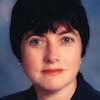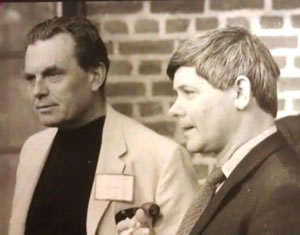A special project for 92Y Unterberg Poetry Center’s 75th anniversary and beyond, 75 at 75 invites authors to listen to recordings from our archive and write a personal response. Here, Clare Cavanagh writes about a reading by Czesław Miłosz. It was recorded live at Lincoln Center on June 26, 1968, as part of a poetry festival produced by the Poetry Center. Also on the recording are Zbigniew Herbert and actress Elżbieta Czyżewska.
Posted on April 20, 2015
 A man who dies at the age of thirty-five remains forever a man who dies at the age of thirty-five, or at least so he will seem to posterity, Walter Benjamin famously warned. A poet who wins the Nobel Prize at the age of sixty-nine and continues to write for another quarter-century to international acclaim likewise becomes for posterity a poet who wins the Nobel Prize and lives on for another quarter-century, writing to international acclaim. But Czesław Miłosz was just shy of his fifty-seventh birthday in this recording of June 26, 1968, and he had no idea what lay in store for him. Or rather, he envisioned a very different fate: “Oh yes, not all of me shall die, there will remain/An item in the fourteenth volume of an encyclopedia/Next to a hundred Millers and Mickey Mouse,” he prophesies bitterly a few years later in “From the Rising of the Sun.”
A man who dies at the age of thirty-five remains forever a man who dies at the age of thirty-five, or at least so he will seem to posterity, Walter Benjamin famously warned. A poet who wins the Nobel Prize at the age of sixty-nine and continues to write for another quarter-century to international acclaim likewise becomes for posterity a poet who wins the Nobel Prize and lives on for another quarter-century, writing to international acclaim. But Czesław Miłosz was just shy of his fifty-seventh birthday in this recording of June 26, 1968, and he had no idea what lay in store for him. Or rather, he envisioned a very different fate: “Oh yes, not all of me shall die, there will remain/An item in the fourteenth volume of an encyclopedia/Next to a hundred Millers and Mickey Mouse,” he prophesies bitterly a few years later in “From the Rising of the Sun.”
 Czesław Miłosz and Zbigniew Herbert in June 1968. Photo by Rollie McKenna
Czesław Miłosz and Zbigniew Herbert in June 1968. Photo by Rollie McKenna
Not that you’d suspect his doubts from the reading itself. The poet whose voice we hear certainly sounds like someone who should go on to win the Nobel Prize. Miłosz reads gloriously and in a much younger voice than the one I remember from our friendship during his last years. But the poems he reads remind us of what the world must have seemed like to him then. Both poems date from his early years in Californian exile, “I Sleep a Lot” and “Cabeza,” the final segment from “Throughout Our Lands.” He’d translated them himself, but they would appear in book form only years later. (Miłosz’s slim Selected Poems came out in 1973, to be followed by another thin volume, Bells in Winter, in 1978.) He could not be published in his native Poland, but in his adoptive land he was best known, he complained, as the translator of Zbigniew Herbert, whose Selected Poems appeared in the same year as this reading—before or after, I don’t know. In any case, Herbert read with him that evening, and the English versions of his poems were Miłosz’s versions, read by Polish actress Elżbieta Czyżewska. Miłosz’s powerful voice belies the loneliness that drives his poems:
When I couldn’t do without alcohol, I drove myself on alcohol, When I couldn’t do without cigarettes and coffee, I drove myself on cigarettes and coffee. I was courageous. Industrious. Nearly a model of virtue. But that is good for nothing.
Please, Doctor, I feel a pain. Not here. No, not here. Even I don’t know. Maybe it’s too many islands and continents, unpronounced words, bazaars, wooden flutes, or too much drinking to the mirror . . . (“I Sleep a Lot”)
Even the final phrase betrays the poet’s isolation: the Polish idiom for “drinking alone”—“drinking to the mirror,”
picie do lustra—remains obstinately untranslated, in spite of its new linguistic home.
And yet, and yet . . . Miłosz carefully prefaces the reading by noting the cataclysmic history that informs his and Herbert’s poetry alike. And the poems Herbert reads—“At the Gates of the Valley,” “Our Fear”—clearly arise from his horrific experience of Nazi-occupied Poland. But Miłosz’s choices do not. He speaks of both California and his beloved native Lithuania in his opening remarks, and the poems themselves are shaped by these warring landscapes in unexpected ways.
“I Sleep a Lot” may begin with the San Francisco Bay, “as if molten tin,/beyond the bay, city, beyond the city, ocean,/beyond the ocean, ocean, till Japan.” But it ends with the intimate, half-pagan landscape of his lost homeland: “I remember those crosses with chiseled suns and moons/and wizards, how they worked during an outbreak of typhus.” Polish critics have followed what they see as Miłosz’s lead in viewing the two landscapes as antipodes, with human-scale, history-laden Lithuania opposing California’s bleak and inhospitable expanses: “dry hills with white grass,/ beyond the hills an irrigated valley where rice is grown,/beyond the valley, mountains and Ponderosa pines,/ beyond the mountains, desert and sheep.”
They’re not entirely mistaken. But I see things differently. I grew up on the southwest corner of the bay that Miłosz viewed from his home on its northeastern slopes. And what I notice, even in these early poems of exile, is his complex, intimate understanding of the landscape he unwillingly inhabits. More than this: his native and adoptive realms share uncanny points of kinship. The fourth stanza of “I Sleep a Lot” is a case in point. “Please, Medicine Man, I feel a pain,” the English runs, and the poet’s healer is clearly a Native American: “When you start to dance/you visit remote pueblos in your sleep/and even lands you have never seen./Put on, I beg you, charms made of feathers,/now it’s time to help one of your own.”
So why is the poet “one of [his] own”? The Polish text provides clues. This is no ordinary medicine man. He’s a znachor, a Polish witch doctor, a Lithuanian folk healer. Lithuanians were Europe’s “Indians,” Miłosz insists on more than one occasion; they were the last European people to be Christianized and, like America’s native tribes, they were converted largely by force, in this case, by crusading Teutonic Knights in the fourteenth century. This medicine man, like the poet, has a double soul, both Lithuanian and local; in his sleep, the shaman visits both “remote pueblos” and “lands he has never seen.” (These unseen lands include, no doubt, Miłosz’s own magical homeland.) Miłosz likewise visited pueblos, and not only pueblos; a Polish visitor to his Berkeley house recalls the poet drawing from memory a map of nearby Indian reservations. “Who am I?” his speaker asks in “Cabeza” (the poem takes its name from a Spanish explorer stranded among native tribes in the sixteenth century):
the lace of cuffs not mine, the table carved with lions not mine, Doña Clara’s fan, the slipper from under her gown—hell, no. On all fours! On all fours! Smear our thighs with war paint. Lick the ground. Wha wha, hu hu.
If you have any doubts about the European Miłosz’s affinity for America’s indigenous tribes, just listen to him read that final line: wonderful!
Miłosz may have longed for his lost Lithuania. But his California, with its manzanitas and freeways, its hidden histories and traces of vanished tribes, always make me homesick.
Clare Cavanagh’s latest work of translation is a Map: Collected and Last Poems. She is author of Lyric Poetry and Modern Politics: Russia, Poland, and the West.